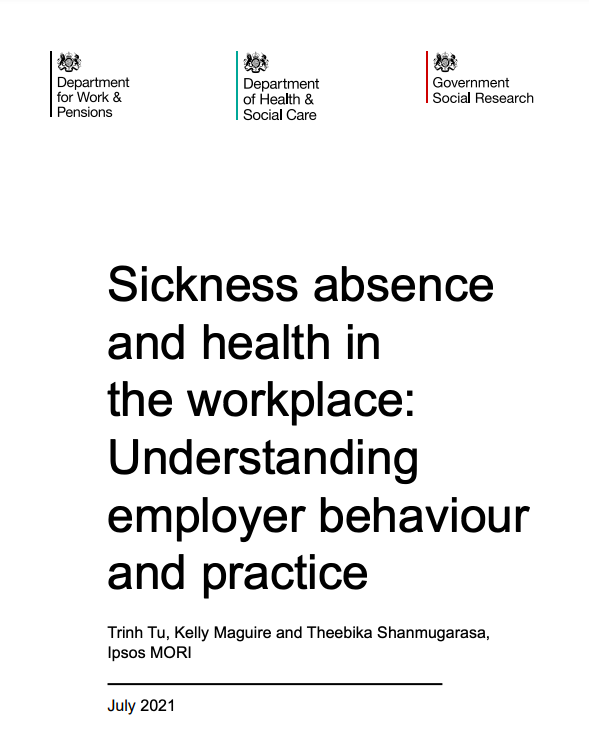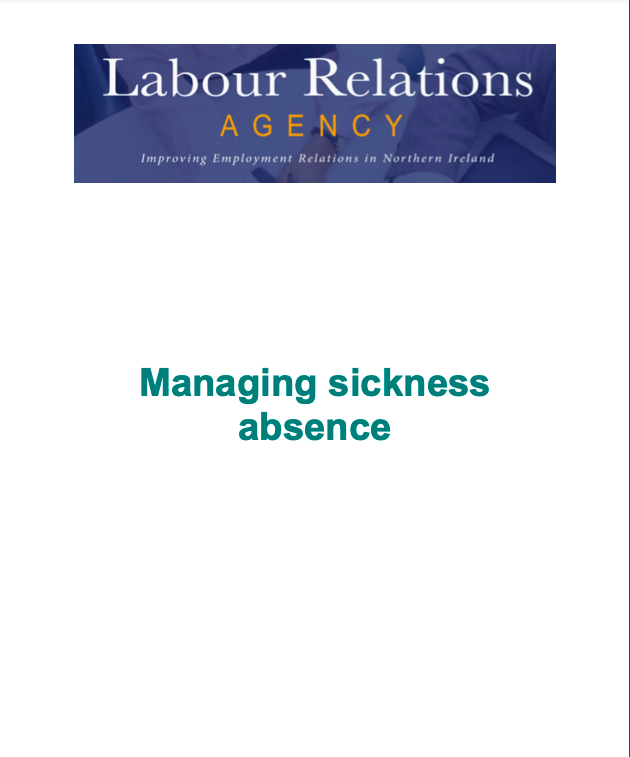What is absence at work and why is it important?
Absence at work refers to the time an employee is not present in the workplace due to a variety of reasons, such as illness, vacation, personal days, or other absences. Absence at work can be either planned or unplanned.
Absence at work is important because it can have an impact on the productivity and efficiency of a business. When an employee is absent, it can disrupt the work flow and create additional workload for other team members. Absence at work can also lead to increased costs for the company, as it may require the hiring of temporary staff or the reallocation of tasks to other employees.
It is important for businesses to have policies and procedures in place to manage absence at work, including procedures for reporting absences and scheduling replacements or covering tasks during absences. This can help to minimize the impact of absences on the business and ensure that work is completed effectively.
Which UK industries suffer from the most unplanned absence by employees?
It is difficult to pinpoint specific industries that suffer from the most unplanned absence by employees, as this can vary depending on a range of factors such as the size and type of the business, the nature of the work, and the demographics of the workforce.
However, research has shown that certain types of businesses and industries may be more prone to higher levels of absenteeism, such as those with a high volume of manual labor, physically demanding work, or hazardous conditions. Industries that have a higher turnover rate or a transient workforce may also experience higher levels of absenteeism.
It is also worth noting that unplanned absence can be influenced by a variety of personal and external factors, such as health issues, family responsibilities, and job satisfaction. Therefore, it is important for businesses to consider and address these factors in order to minimize the impact of unplanned absences on the workplace.
How many absences are acceptable per year at work?
The number of absences that are acceptable at work can vary depending on the specific policies and expectations of the business and the industry in which it operates. Some businesses may have more lenient policies regarding absences, while others may have stricter policies.
It is generally expected that employees will be present and punctual at work, and most businesses have policies in place to address absenteeism. In general, excessive absences or a pattern of regular absences can be a cause for concern and may be addressed through disciplinary action or termination of employment.
It is important for employees to be aware of their company’s policies and expectations regarding absences, and to make every effort to be present and punctual at work. If an employee does need to be absent for any reason, it is important to follow the appropriate procedures for reporting absences and obtaining approval, if necessary.
How has working from home impacted on unauthorized leave?
Working from home can impact unauthorized leave in a number of ways. One potential impact is that employees may be more likely to take unauthorized leave if they are not physically present in the office. This can be due to a variety of reasons, such as feeling less accountable for their attendance or having more flexibility with their schedule.
Additionally, working from home may also make it more difficult for managers to monitor and track employee attendance, which could lead to more instances of unauthorized leave.
On the other hand, working from home may also have the opposite effect, as some employees may be more motivated to work consistently and avoid taking unauthorized leave due to the increased flexibility and autonomy that comes with remote work.
Overall, the impact of working from home on unauthorized leave will depend on the specific circumstances and policies of the organization, as well as the individual habits and motivations of the employees.
What can managers do to reduce workplace absence?
There are a number of strategies that managers can use to reduce absenteeism in the workplace:
- Establish clear policies and expectations: Make sure that employees are aware of the company’s policies and expectations regarding attendance and absences, and communicate the consequences of excessive or habitual absenteeism.
- Encourage open communication: Encourage employees to communicate with their managers about any issues that may be impacting their attendance, and offer support and resources to help employees manage these issues.
- Promote a positive work culture: A positive work culture that values and supports employees can help to reduce absenteeism. This may include offering flexible work arrangements, promoting work-life balance, and providing opportunities for professional development and growth.
- Identify and address underlying issues: Identify and address any underlying issues that may be contributing to absenteeism, such as health issues, personal problems, or job dissatisfaction.
- Monitor and track absences: Regularly monitor and track absences to identify patterns or trends that may indicate a problem. This can help managers to take proactive steps to address the issue and prevent future absences.
By implementing these strategies, managers can help to reduce absenteeism and maintain a productive and efficient workforce.
In the UK can you sack an employee for being absent?
In the United Kingdom, an employee can be dismissed for absenteeism if it is deemed to be excessive or if it is having a negative impact on the business. However, it is important for the employer to follow a fair and consistent disciplinary process, and to consider any underlying issues that may be contributing to the employee’s absences.
According to UK employment law, an employer must have a valid reason for dismissing an employee, and the dismissal must be fair. This means that the employer must be able to demonstrate that the employee’s absences were having a negative impact on the business, and that the employee was aware of the company’s policies and expectations regarding attendance.
Before dismissing an employee for absenteeism, the employer should follow a disciplinary process that includes:
- Clearly communicating the company’s attendance policies and expectations to the employee
- Providing the employee with support and resources to address any underlying issues that may be contributing to their absences
- Holding a meeting with the employee to discuss their absences and the impact on the business
- Giving the employee an opportunity to explain their absences and provide any relevant information
- Allowing the employee to appeal the decision, if necessary
It is important for employers to follow this process in order to ensure that any dismissal is fair and in accordance with UK employment law.
What legislation covers employee absence in the UK?
There are several pieces of legislation that outline the rights and responsibilities of employers and employees in relation to attendance and absences at work.
The Employment Rights Act 1996 sets out the rights of employees in relation to taking time off work, including the right to take time off for emergencies, to care for dependents, and to take leave for certain events, such as weddings or the birth of a child.
The Working Time Regulations 1998 establish the minimum rights of workers in relation to working hours, rest breaks, and holiday entitlements.
The Health and Safety at Work Act 1974 requires employers to protect the health, safety, and welfare of their employees, which may include providing appropriate support and resources to employees who are absent due to illness or injury.
In addition to these laws, many businesses have their own policies and procedures in place to manage absences and attendance, which may include provisions for reporting absences, requesting time off, and addressing excessive or habitual absenteeism. It is important for both employers and employees to be aware of these policies and to follow them in order to ensure compliance with the law and to maintain a productive and efficient workplace.
Does a company have to pay employees who are absent without leave?
In the United Kingdom, an employee who is absent without leave, also known as “unauthorized absence,” is not entitled to pay from their employer.
Under UK law, employees are generally required to obtain approval from their employer before taking time off work. If an employee is absent without leave, the employer is not obliged to pay the employee for the time they are absent. However, the employer may choose to do so as a matter of policy or goodwill.
It is important for employees to be aware of their company’s policies and procedures for requesting time off and to follow these procedures in order to ensure that they are entitled to pay while absent. If an employee is absent without leave, they may be subject to disciplinary action, including the possibility of dismissal.
Can you provide an example of an employee absence management policy?
Here is an example of an employee absence management policy:
Policy statement:
Our company values the attendance and punctuality of our employees and expects them to be present and punctual at work. However, we understand that there may be circumstances in which employees need to be absent. This policy outlines our procedures for managing absences and addressing excessive or habitual absenteeism.
Procedures:
- Reporting absences: Employees are required to inform their manager as soon as possible if they will be absent from work. If the absence is planned, employees should request time off in advance, using the company’s time-off request process. If the absence is unplanned, employees should inform their manager as soon as possible, and provide a reason for the absence if possible.
- Approval of absences: Absences may be approved or denied at the discretion of the employee’s manager. Employees should not assume that their absence will be approved until they receive confirmation from their manager.
- Paid time off: Employees are entitled to paid time off for certain types of absences, such as vacation, personal days, and time off for emergencies or to care for dependents. The amount of paid time off to which an employee is entitled will be based on their length of service and position within the company.
- Unpaid time off: Employees may request unpaid time off for personal or medical reasons. Unpaid time off may be approved at the discretion of the employee’s manager.
- Excessive or habitual absenteeism: Excessive or habitual absenteeism may be cause for disciplinary action, including the possibility of termination of employment. If an employee’s absences are having a negative impact on the business, the employee may be required to meet with their manager to discuss the issue and develop a plan to address it.
It is important for employees to be aware of and follow this policy in order to ensure that their attendance and punctuality meet the standards expected by the company.
What web resources are available for UK employers who want to understand more about managing unauthorized absence?
There are several web resources available for UK employers who want to learn more about managing unauthorized absences:
- Acas (Advisory, Conciliation and Arbitration Service): Acas is a UK government agency that provides information, advice, and training on employment relations and workplace issues, including absence management. Employers can find guidance and resources on managing absenteeism on the Acas website: https://www.acas.org.uk/absence-from-work
- CIPD (Chartered Institute of Personnel and Development): The CIPD is a professional body for HR and people development, and offers resources and guidance on a range of employment-related topics, including absence management. Employers can find guidance on managing absenteeism on the CIPD website: https://www.cipd.co.uk/knowledge/fundamentals/relations/absence
- GOV.UK: GOV.UK is the UK government’s official website, and provides information and guidance on a range of employment-related topics, including absence management. Employers can find guidance on managing absences on the GOV.UK website: https://www.gov.uk/manage-staff-absences
- Employee Benefits: Employee Benefits is a UK-based website that provides information and resources on employee benefits, including absence management. Employers can find guidance on managing absences on the Employee Benefits website: https://www.employeebenefits.co.uk/absence-management-how-to-better-equip-your-line-managers/
These resources can provide useful information and guidance for UK employers who want to understand more about managing unauthorized absences and minimizing the impact of absences on their business.








